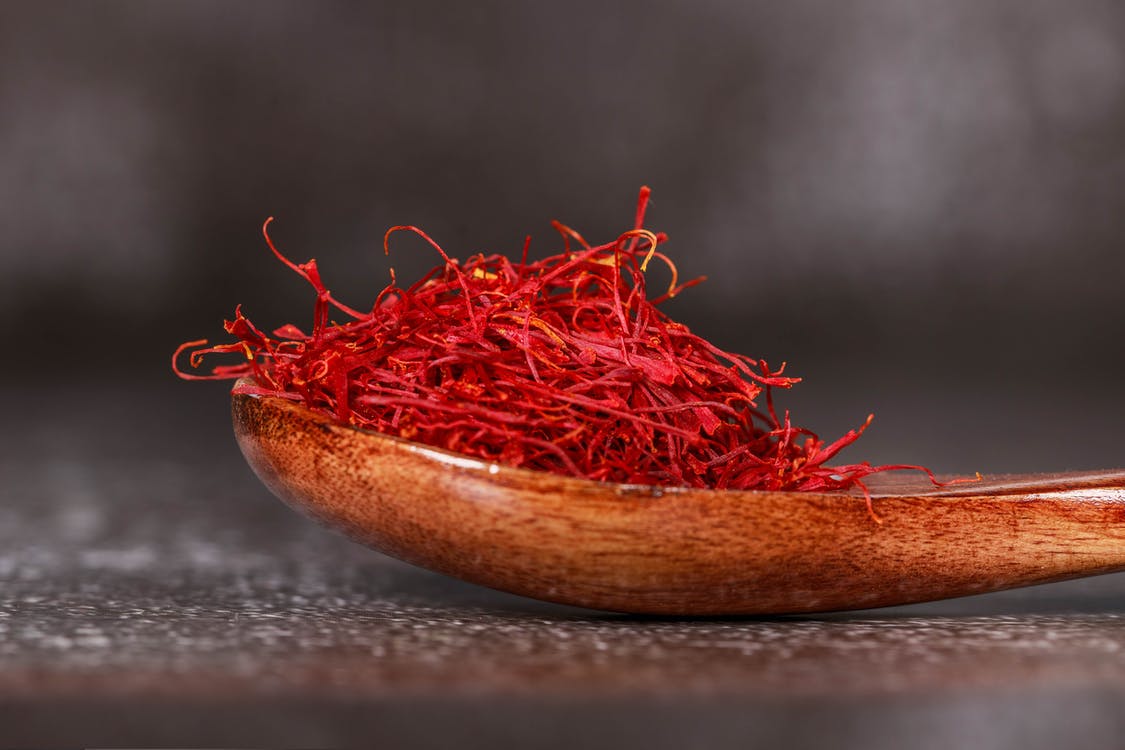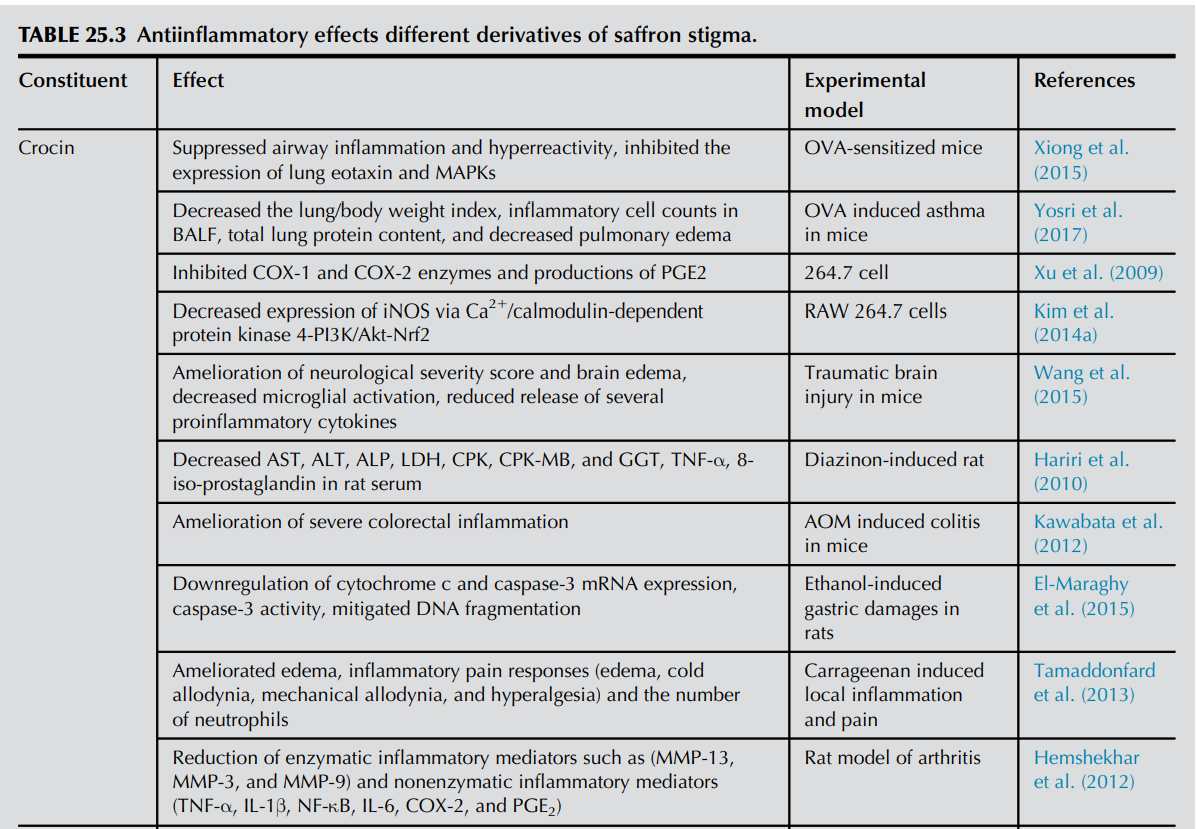
Saffron is one of the most expensive spices in the world, with a costly production process.
The spice comes from the flower saffron crocus flower or Crocus sativus. The thread-like structures of the flower called stigma give saffron its name.
Crocin is the most chemically active component of saffron and one of its main carotenoids. It is the chemical that gives saffron its distinct red color.
Crocin extract tablets are used as supplements for their anti-inflammatory, antioxidant, and immunomodulatory benefits.
Benefits of Crocin of Saffron
A variety of benefits has been identified through a range of studies. Research has shown that there is a lot of potential for crocin of Saffron supplements when it comes to the prevention and treatment of various ailments in the body.
Anti-Inflammatory Benefits of Crocin of Saffron
One of the most important and prominent benefits of crocin of saffron comes in the form of its anti-inflammatory action.
A range of studies has indicated that crocin of saffron can be helpful in reducing various types of inflammation.
A 2012 study conducted by Tamaddonfard and his team explored the impact of crocin on local inflammation in histamine-induced rats. The inflammation was introduced in the rats’ paws.
Results showed that injecting 100 and 200 mg/kg of crocin along with 10 mg/kg of chlorpheniramine ended up decreasing two biomarkers of inflammation: the infiltration of neutrophils in paw tissues and paw thickness. The results indicate that crocin suppresses the receptor function of histamine H1 and reduces inflammation in histamine-induced local paw edema.
Antioxidant Action of Crocin of Saffron
Saffron is considered a strong antioxidant agent. Its antioxidant properties have been explored in a range of studies.
Over the last few years, the crocin of saffron has also generated a great deal of interest for its antioxidant potential. It has been suggested that a lot of antioxidant properties of saffron come from crocin, although other components of saffron have also shown such potential.
A 2008 study by Syed Asdaq and Mohammed Inamdar compared the antioxidant action of saffron and crocin. They found out that while both showed a significant potential for antioxidant action, saffron proved to be much more efficient at the task.
It must be noted that this was a test tube study and was far from conclusive in how saffron and crocin would behave in animal and human models.
A later study exploring the antioxidant impact of crocin showed similar results. The study was conducted by Nasir Abedimanesh and his team in 2017 with human subjects. The study also compared the antioxidant impact of saffron and crocin.
A total of 84 patients suffering from coronary artery disease participated in this randomized, double-blind and placebo-controlled study. For a total of 8 weeks, the intervention groups received 30 mg doses of saffron aqueous extract and crocin.
Compared to the placebo group, the intervention groups both showed significant improvement. Both crocin and saffron aqueous extract resulted in improvements across several markers, such as body composition, dietary intake, and appetite.
Between the two groups, the one receiving 30 mg of saffron aqueous extract performed relatively better than those receiving crocin. However, this difference was considerably less than the one noted in the previous study mentioned above.
While more studies are needed to ascertain how efficient the antioxidant effect of crocin is for different ailments, the results so far are very promising.
Immunomodulatory Effects of Crocin of Saffron
The main job of the immune system is to protect the body against various pathogens that invade it and the ensuing mediators. These pathogens and mediators cause diseases. If the immune system is imbalanced, it can lead to a variety of harmful disorders in the body.
A lot of factors may disturb the immune system. The immune system is highly affected by an inflammatory response and oxidative stress.
Excessive inflammation and oxidative stress may cause inflammatory mediators (EGFR, LTB4, TNFα, IL-6, TGF-β, IL-1b, and IL-8) to increase. They may also increase epithelial cells, neutrophils, macrophages, and CD81 lymphocytes. All of these reactions are bad for the immune system and impair its efficacy and response time.
Many studies are focused on finding a therapeutic agent that can treat and prevent both immune-mediated and inflammatory diseases.
Evidently, the crocin of saffron is that agent.
The following table found in a book by Boskabaddy and other authors (page no. 413) summarizes the immunomodulating impact of crocin on saffron and the various studies that studied this impact.

This table shows that there is a lot of research-based evidence on the immunomodulatory benefits of crocin of saffron. It must be noted here that crocin is not the only derivative of saffron that exhibits these properties. Other derivatives, such as crocetin and safranal, have also shown many immunomodulatory properties, but crocin is the one with the most prominent effects.
Further research is needed to compare the immunomodulatory effects of different derivatives of saffron, but the results look really promising for crocin.
Anti-Asthma Effects of Crocin of Saffron
Asthma is a chronic respiratory disease that can be severely debilitating to the everyday life of the patient.
It has been suggested by various studies that crocin of saffron can exhibit qualities that can provide a promising treatment for asthma. Many animal studies have established the causal link between the crocin of saffron and its anti-asthmatic properties.

A 2019 human study by Marzie Zilaee and their team further cemented that link through their double-blinded and placebo-controlled experiment. In the study, a total of 80 test subjects were divided into intervention and control groups, where the former received two saffron capsules of 100 mg per day, and the latter received two placebo capsules each day.
The researchers tracked all the major clinical symptoms of asthma, including
- The use of salbutamol spray
- How often the patients experienced shortness of breath during the night and daytime
- Activity limitation due to asthma,
- How often they woke up because of asthma symptoms
This study lasted for eight weeks and showed that the patients receiving saffron capsules showed a significant improvement in asthma symptoms. Other than that, the severity of asthma also improved remarkably in the intervention group as compared to the control group.
The researchers ensured that the concentration of crocin in saffron capsule doses was consistent. Each dose consisted of 304.3 mg/kg of crocin.
This study shows that the anti-inflammatory properties of crocin of saffron can be a powerful anti-asthmatic agent and that the anti-inflammatory properties of crocin also help asthmatic patients.
More studies are needed to be done to measure the impact of crocin for longer periods of time to establish it as a formidable anti-asthmatic supplement.
Chemotherapy-Induced Peripheral Neuropathy
Peripheral neuropathy is a condition where the nerves that are present outside of the spinal cord and brain undergo a significant amount of damage.
Chemotherapy-induced peripheral neuropathy (CIPN) is a condition where chemotherapy in cancer patients ends up causing a lot of damage to the nerves, leaving the patients in a substantial amount of pain. Different types of nerves, such as automatic, motor, and sensory, can undergo such damage by neurotoxic antitumor agents. The results are often disabling for the patient.

A 2021 study by Hooman Bozorg and their team researched the efficacy of crocin of saffron in helping relieve the symptoms of CIPN. The study comprised 177 patients with mild to severe symptoms of CIPN.
The participants were divided into intervention and control groups. The intervention group received 30 mg of crocin of saffron daily, while the latter received a placebo.
Compared to the placebo group, the intervention group showed a considerable and significant improvement in the symptoms of CIPN. The severity and frequency of symptoms were reduced, and patients reported a much better pain management experience.
This study showed that crocin of saffron could be an excellent source of pain management and reduction of other symptoms for patients of CIPN.
Other Benefits
Other studies have pointed towards many other possible benefits of crocin of saffron. Some of the benefits include:
- Antitumor properties
- Cardioprotective properties
- Aphrodisiac benefits
- Antidementia benefits
- Antidepressant action
- Antixylotic properties.
Further studies are needed to back these benefits of crocin with evidence-based research.
Frequently Asked Questions
Following is a list of the most frequently asked questions about the crocin of saffron.
1. What is the recommended dosage of crocin of saffron?
There is no recommended dosage for crocin of saffron. Different people take these supplements for different reasons, and the doses may vary for those reasons.
Studies have shown crocin of saffron to be safe for consumption in doses between 300 mg to 500 mg per day for a short period of time. Other studies have shown that people can take crocin of saffron at lower doses for up to 8 weeks without any issues.
2. Should I be aware of any side effects of these supplements?
Some studies have pointed towards some side effects when crocin of saffron supplements are consumed, but none of the side effects was serious in nature and was easily managed without needing to discontinue supplementation.
In a study, one participant with a history of kidney stones felt a burning sensation in his kidney. Another participant experienced burning in his body 30 mins after their dose and had changes in urinary frequency. A woman volunteer also reported an earlier period with a heavier flow.
However, all of these issues were easily managed, and the subjects continued with the supplementation.
3. Can pregnant and breastfeeding women consume crocin of saffron?
It is better for pregnant and breastfeeding women to avoid taking these supplements. If they must, they should consult with their healthcare provider before they start.
